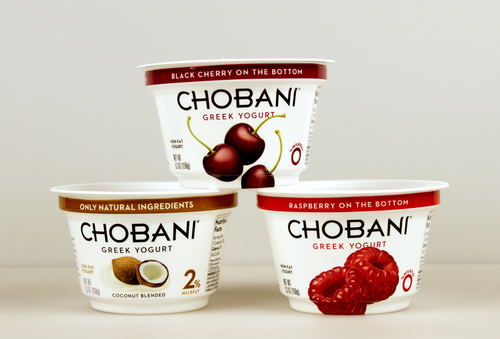Short answer
Often touted as a health food worthy of the gods, Chobani Greek Yogurt has enough added sugar and questionable ingredients to make it a snack best consumed in moderation.
Recommended Alternative
Long answer
Greek yogurt has taken the world by a storm. Less than ten years ago this thickened, tangy dairy product was hard to find; now the dairy isle of most grocery stores is filled with Greek yogurt in a wide array of brands and flavors. Chobani yogurt has been synonymous with this surge in popularity. Perceived as a healthy, 'all-natural' yogurt option, many people view this product as the perfect diet food. But does it live up to its own claims?
The truth is a little more complex. Greek yogurt is made by straining regular yogurt to remove excess whey and lactose (the milk sugar). This results in a thicker, more concentrated dairy product that is marginally lower in sugar and significantly higher (twice as high) in protein than regular yogurt. Beneficial probiotics are also plentiful, keeping the consumer's gut healthy and bio-diverse. Leucine, an amino acid needed for the body to get positive results from workouts, is plentiful in every serving of Chobani. Greek yogurt is also easier on the digestion system for lactose intolerant people because much of the lactose is strained out in the thickening process. Plain Greek yogurt naturally has these healthy benefits, but it's what's added to the product that can be harmful to the consumer.
Like most convenience foods produced for the American market, flavored varieties of Chobani yogurt have unexpectedly high levels of sugar. Plain Greek yogurt has 6 grams of sugar per 5.3 oz serving size container while Chobani's blueberry flavor contains 15 grams of sugar. This means that a single serving of their yogurt contains 9 grams of added sugars. The company goes out of its way to inform consumers they don't use artificial sweeteners, but rather get their sweetness from milk sugars, real fruit, honey, evaporated cane juice, vanilla, and chocolate chunks. This seems great at first glance, but unfortunately, the human body is not very picky about whether sugars are 'natural' or not and processes them all the same way- turning them into body fat. Eating just one Chobani yogurt per day will result in 8 ½ pounds of excess sugar consumed every year.
In recent years Chobani has come under controversy for their use of genetically modified organisms (GMOs). Though the company advertises that they use only natural ingredients in their yogurt, various sources say that they use milk from cows fed on a diet of GMO grains. Protesters have tried to get the company to change their labeling and switch over to all organic ingredients, but for now, Chobani has simply changed their marketing strategy. Instead of claiming to be 'all natural', Chobani has now re-branded itself as using 'real' ingredients. That being said, most Chobani yogurt flavors have fewer than ten ingredients and contain none that take a science degree to understand. Complex terms in the ingredient list are a result of the necessary fermenting agents.
The verdict? Enjoy your Chobani yogurt, but keep it simple. Stick to plain and add your own healthy toppings.
Possible short-term side effects
- gut problems
- skin irritation
- intestinal discomfort and bloating (if lactose intolerant)
- spike in blood sugar levels
Possible long-term side effects
- diabetes (for flavored varieties)
Ingredients to be aware of
- 9 grams of added sugar per serving
- milk products produced from gmo-fed cows
- lactose (for those that are intolerant)

Benefits
- increased healthy probiotics in digestive system
- feeling of prolonged fullness from protein
- better workout results from leucine
- robust immune system
Healthier alternatives
- avoid flavored varieties
Recommended Variety (what is this?)
Plain Chobani Greek Yogurt
- High in protein
- Non-fat
- Probiotic content
- Versatile plain flavor
 Approved by
Approved by 















